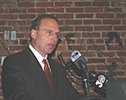Last week, Gov. Haley Barbour did as expected and vetoed Senate Bill 2310, calling it an "irresponsible" revenue change "in a time of fiscal uncertainty." Barbour's office claims the state would lose $1.5 billion, and cities would lose $166 million over nine years. The bill went back to the Senate, but the Senate Finance Committee voted almost immediately 14-to-10 in favor of recommending that the Senate override the governor's veto.
Early this week, debate on the economic feasibility of the bill continues to rage.
Senate Bill 2310 raises the cigarette tax from 18 cents per pack to 75 cents in July and to $1 a year later. The 7 percent sales tax on groceries would drop to 4.5 percent in July and be phased out by 2014.
Some House and Senate members consider Mississippi's 7 percent sales tax on groceries regressive by many accounts, claiming the tax unfairly victimizes the state's poor, who must dedicate a bigger percentage of their monthly income to food, whereas the state's wealthy dedicate a comparatively bigger percentage of their income to luxury purchases or savings.
Mayors and city representatives, however, are nervous about the bill, saying the money from sales taxes comprise a sizable percentage of small town or city budgets.
The Mississippi Municipal League opposed Senate Bill 2310 and asked members of the state Senate to sustain the governor's veto. Last week, MML took its concerns to the office of Lt. Gov. Amy Tuck, who champions the bill, and convinced her to make changes in the bill.
"The Senate passed SB 1610, which allows for $50 million to be diverted into the tobacco fund. The Municipal League said 'that's not enough.' They showed us their numbers and we agreed with them. So the House produced a technical amendments bill (HB1140) that allows us to put another $7.5 million in that tobacco diversion fund, which brings them to $57.5 million, which is exactly what the cities made from sales taxes last year," says Joseph Ammerman, director of communications for Tuck's office.
Still, MML stands against a veto override, saying it has received no assurances from the Senate or House leadership that cities' concerns will be addressed.
"A city or town that has been working hard to attract a new grocery store or convenience store would see absolutely no increase in grocery sales tax revenue beyond what it was in 2005. For many of our small towns in the state, grocery sales tax revenue is the primary source of income," said MML Executive Director George Lewis.
"We are particularly concerned about how this plan would affect cities and towns along the Gulf Coast whose sales tax collections were dramatically reduced after Hurricane Katrina. Reimbursing these cities and towns based on 2005 (statistics) would be devastating to their budgets."
Pete Smith, communications officer for Barbour, said the numbers in the vetoed bill likewise didn't account for a growing economy.
"The difference between the Senate's numbers and the governor's numbers is that they didn't reflect growth," Smith said. "The sales growth has been growing over five percent each year and the bottom line is the state stands to lose $1.5 billion to its general fund and cities stand (to) lose more than $166 million."
Ammerman said last Friday that the State Tax Commission calculated new figures representing 15 years of budget changes as a result of the tax swap. The commission made a point to account for 4 percent growth—based on average growth from preceding years. The figures produced by the Tax Commission reflect the state giving considerably more money back to cities—pulled from a state tobacco tax fund collected through cigarette taxes.
"Here's an example," said Ammerman, holding figures released by Barbour's office. "The governor is showing a total loss to (the town of) Poplarville of $909,000, and that next year Poplarville will be repaid by the state $17,630.07. The State Tax Commission shows that it'll be repaid $123,624.15. Barbour's mistake was off by $105,994. Now these are numbers we had the Tax Commission run for us. Barbour used the same beginning number from the Tax Commission, but we don't know where Barbour got his formula.
"We think that formula is suspect."
Barbour's numbers show that the city of Jackson will get repaid $731,195.53 from the tobacco taxes. The commission's figures show that the city will be reimbursed $4,326,447.24 from those taxes, a discrepancy of more than $3.5 million.
Joe Blount, chairman and commissioner of revenue at the Mississippi Tax Commission, did not return calls by press time.
Smith did not immediately explain the formula used by the governor's office, but repeated that the tax was flawed.
Dr. Patrick Barrett, chairman of the board of trustees for the Mississippi State Medical Association, said he endorsed the tobacco tax for health reasons and the amount of money the state would save in medical costs from potential smokers discouraged by high cigarette costs.
"Scores of scientific studies and surveys assure that a $1 tax will force nearly 24,000 Mississippians to stop smoking. Twenty percent of state teens will quit. I say put the politics aside, put an end to these senseless deaths and put a pen to 2310," Barrett said.
Meanwhile, Sen. Charlie Ross, R-Brandon, said he intended to vote to sustain the governor's veto, saying, "The times are too uncertain."
"The Legislature has a habit of authorizing spending programs without first identifying where the funds are coming from. There're arguments about the amounts and everything, but in my judgment it creates a gap in our budget, and it's not the proper time to have one," Ross said.



Comments
Use the comment form below to begin a discussion about this content.
comments powered by Disqus